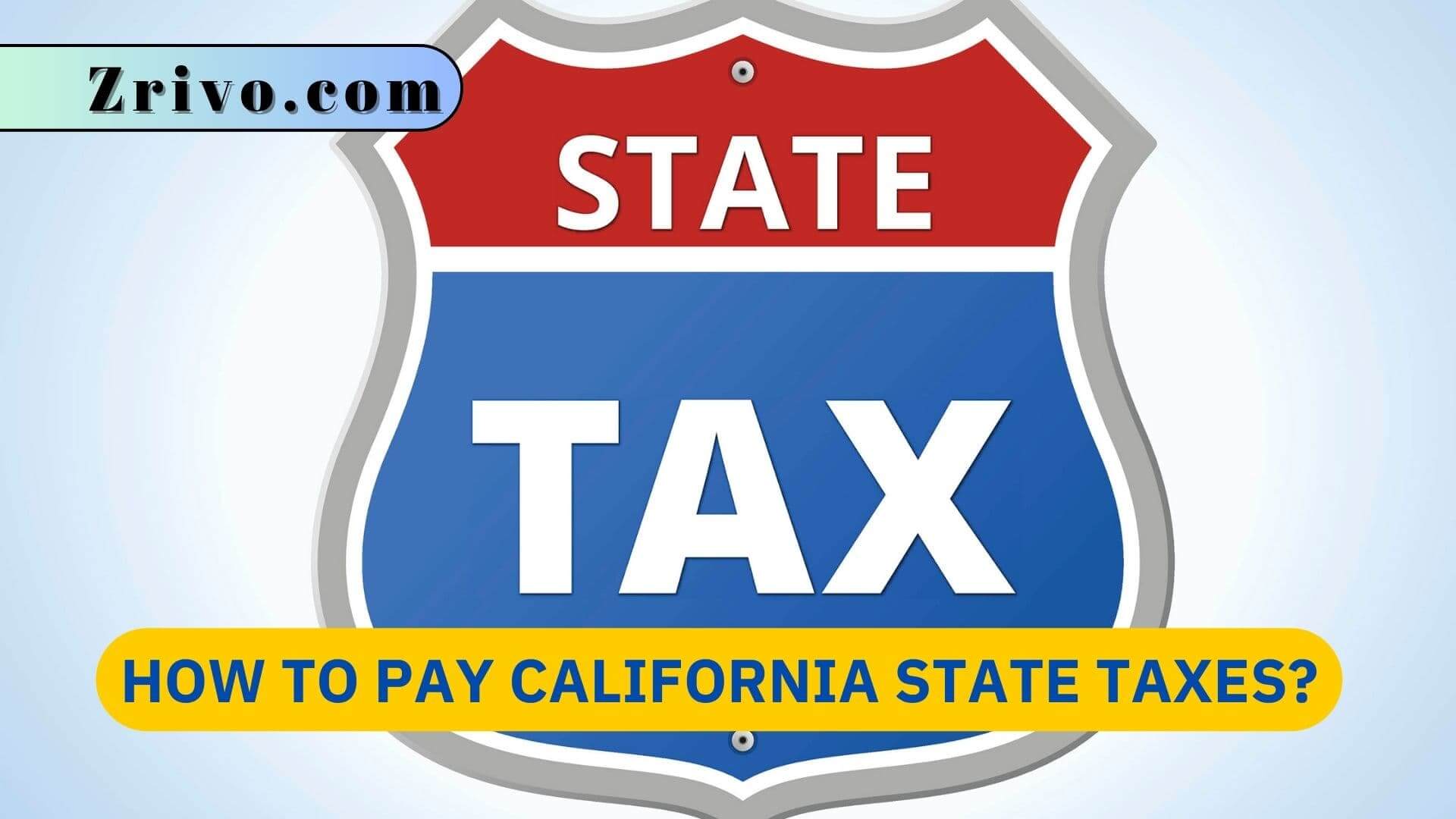How To Pay California State, classified as a noun, describes a specific process for settling financial obligations owed to the government of California. For instance, when a business calculates its sales tax liability for the quarter, it must follow the "How To Pay California State" guidelines to submit the correct amount and avoid late fees or penalties.
Understanding "How To Pay California State" is crucial for businesses operating within the state as it ensures timely and accurate fulfillment of tax obligations. Moreover, compliance with these guidelines helps businesses maintain a positive relationship with the government and avoid legal complications. The establishment of the California Department of Tax and Fee Administration in 1993 marked a significant historical development, centralizing the administration and enforcement of tax laws, including the "How To Pay California State" regulations.
This article will provide a comprehensive overview of "How To Pay California State," exploring the various methods available, payment deadlines, penalties for late payments, and other relevant information to assist businesses in meeting their tax obligations effectively.
How To Pay California State
When navigating the complexities of "How To Pay California State," it's essential to consider key aspects that impact the process. These include identifying the correct payment method, understanding payment deadlines, and navigating potential penalties for late payments.
- Methods: Explore the various payment options available, such as online, mail, or in-person.
- Deadlines: Comprehend the specific due dates for different tax types and penalties for late submissions.
- Penalties: Understand the consequences of late payments, including interest charges and potential legal action.
- Forms: Identify the appropriate forms required for specific tax payments and ensure accurate completion.
- Documentation: Gather and organize necessary supporting documentation to substantiate payments.
- Online Account: Utilize the California Department of Tax and Fee Administration's online portal for convenient payment and account management.
- Payment Plan: Explore installment payment options if unable to pay in full, understanding the terms and conditions.
- Professional Assistance: Consider consulting with a tax professional or accountant for guidance on complex payment scenarios.
- Legal Compliance: Stay informed about any changes in tax laws and regulations to ensure ongoing compliance.
Understanding these key aspects empowers businesses to fulfill their tax obligations efficiently and avoid potential legal complications. By carefully considering each aspect, businesses can navigate the "How To Pay California State" process with confidence and accuracy.
Methods
When considering "How To Pay California State," understanding the available payment methods is crucial. Businesses can choose from online, mail, or in-person options, each with its advantages and considerations. Selecting the appropriate method depends on factors such as convenience, processing time, and security concerns. Payment methods play a critical role in ensuring timely and accurate fulfillment of tax obligations, impacting compliance and potential penalties.
Online payment has become increasingly popular due to its convenience and efficiency. The California Department of Tax and Fee Administration's online portal allows businesses to make payments securely and track their payment history. Mail remains a widely accepted method, providing a physical record of the transaction. However, it may involve longer processing times and potential postal delays. In-person payments offer the advantage of immediate confirmation but may be limited by location and availability during business hours.
Understanding the implications of each payment method empowers businesses to make informed decisions. For instance, if a payment is time-sensitive, online payment may be the preferred choice to avoid late fees or penalties. Recognizing the available options and their potential impact allows businesses to navigate the "How To Pay California State" process effectively and maintain compliance.
Deadlines
Understanding "Deadlines: Comprehend the specific due dates for different tax types and penalties for late submissions." is crucial within the broader scope of "How To Pay California State." Timely fulfillment of tax obligations ensures compliance and minimizes potential legal complications. Failure to meet these deadlines may result in penalties, interest charges, or even legal action.
- Tax Type Deadlines: Different tax types have specific due dates. For instance, sales and use tax returns are generally due on the last day of the month following the reporting period.
- Extension Deadlines: Businesses may request an extension to file their tax return, but the tax payment deadline remains unchanged. Extensions do not grant additional time to pay taxes.
- Late Payment Penalties: Late payments incur penalties and interest charges, increasing the overall tax liability. Penalties vary depending on the tax type and the length of the delay.
- Legal Consequences: Persistent late payments may lead to legal action, including liens or levies on assets, and potential criminal charges in severe cases.
Comprehending these deadlines and their implications empowers businesses to manage their tax obligations effectively. By meeting due dates and avoiding late payments, businesses can maintain compliance, minimize financial burdens, and preserve their reputation.
Penalties
Within the context of "How To Pay California State," understanding penalties holds significant importance. Late payments trigger a series of consequences that can impact a business's financial standing and legal compliance. Penalties serve as a deterrent, emphasizing the importance of timely tax payments.
A primary effect of late payments is the imposition of interest charges. These charges accrue daily, increasing the overall tax liability. The interest rate is determined by the California Department of Tax and Fee Administration (CDTFA) and is subject to change. Businesses should be aware of the applicable interest rates to estimate the potential financial impact of late payments.
In addition to interest charges, late payments may also lead to legal consequences. Persistent late payments can result in the CDTFA taking legal action, including issuing liens or levies on assets. In severe cases, criminal charges may be filed. These actions can damage a business's reputation and hinder its ability to operate smoothly.
Understanding penalties is a critical component of "How To Pay California State." By recognizing the consequences of late payments, businesses can take proactive steps to avoid these penalties. Timely payments ensure compliance, minimize financial burdens, and preserve a positive relationship with the CDTFA.
Forms
When considering "How To Pay California State," understanding the appropriate forms required for specific tax payments is paramount. Accurate completion of these forms ensures timely processing, reduces errors, and minimizes the risk of penalties. Failure to use the correct forms or provide accurate information can delay processing, result in rejected payments, and lead to additional fees or penalties.
- Form Selection: Identifying the correct form for a specific tax payment is crucial. The California Department of Tax and Fee Administration (CDTFA) provides a comprehensive list of forms for various tax types, including sales and use tax, income tax, and franchise tax.
- Form Completion: Completing tax forms accurately requires careful attention to instructions and calculations. Common errors include incorrect taxpayer information, missing or incomplete data, and mathematical mistakes. Thoroughly reviewing the form before submission helps ensure accuracy.
- Supporting Documentation: Depending on the tax type, supporting documentation may be required to substantiate the information provided on the tax form. Gathering and organizing these documents, such as invoices, receipts, or financial statements, helps support the taxpayer's claims.
- Timely Filing: In addition to using the correct forms and completing them accurately, timely filing is essential. Meeting the established deadlines for filing tax returns and making payments avoids late fees and penalties, ensuring compliance with state tax laws.
Understanding the significance of forms in "How To Pay California State" empowers businesses to fulfill their tax obligations accurately and efficiently. By selecting the appropriate forms, completing them meticulously, gathering necessary supporting documentation, and filing on time, businesses can maintain compliance, avoid penalties, and establish a positive relationship with the CDTFA.
Documentation
Within the context of "How To Pay California State," documentation plays a critical role in substantiating payments, ensuring accuracy, and maintaining compliance. Supporting documentation provides a tangible record of transactions, supporting the information reported on tax forms and ensuring proper allocation of payments.
Real-life examples of supporting documentation include invoices, receipts, bank statements, and financial reports. These documents serve as evidence of business expenses, purchases, and other transactions relevant to tax calculations. By gathering and organizing these documents, businesses can provide a clear audit trail, reducing the risk of errors or disputes during tax audits.
The practical significance of understanding the importance of documentation lies in its ability to streamline the payment process, minimize the chances of penalties, and build trust with tax authorities. Accurate and organized documentation enables efficient processing of payments, reducing delays and ensuring timely fulfillment of tax obligations. Moreover, it helps businesses avoid potential penalties associated with incorrect or missing information, safeguarding their financial interests.
In summary, documentation is an essential component of "How To Pay California State." By gathering and organizing necessary supporting documentation, businesses can substantiate their payments, maintain compliance, and minimize the risk of penalties. This understanding empowers businesses to navigate the tax payment process with confidence, ensuring accuracy, transparency, and a positive relationship with the California Department of Tax and Fee Administration.
Online Account
Within the context of "How To Pay California State," the online account provided by the California Department of Tax and Fee Administration (CDTFA) plays a pivotal role in streamlining the payment process and enhancing overall account management. This online portal offers a secure and efficient platform for businesses to fulfill their tax obligations and monitor their account status.
The CDTFA's online account serves as a central hub for managing tax payments. It allows businesses to view their tax history, make payments online, and access various account-related information. The convenience of online payments eliminates the need for physical check writing, mailing, or in-person visits, saving businesses valuable time and resources. Moreover, the online portal provides real-time updates on payment status, reducing the risk of errors or delays in processing.
The importance of the online account extends beyond mere convenience. It enhances accuracy by minimizing manual errors associated with traditional payment methods. Businesses can easily enter payment information, view payment history, and receive electronic confirmation of transactions. This streamlined process reduces the likelihood of incorrect payments or missed deadlines, ensuring timely fulfillment of tax obligations.
Understanding the significance of the CDTFA's online account empowers businesses to navigate the "How To Pay California State" process efficiently. By utilizing this online portal, businesses can streamline payments, minimize errors, and gain greater control over their tax accounts. This understanding fosters compliance, reduces the risk of penalties, and establishes a positive relationship with the CDTFA.
Payment Plan
Within the broader context of "How To Pay California State," the concept of a payment plan holds significant relevance. It provides businesses with a structured approach to fulfilling their tax obligations, even when facing financial constraints. A payment plan allows businesses to spread out their tax liability into manageable installments, easing the burden of a lump sum payment.
Understanding the terms and conditions associated with a payment plan is crucial. These conditions typically include the installment amount, payment frequency, and potential interest charges. By carefully reviewing and comprehending these terms, businesses can make informed decisions and avoid any misunderstandings or penalties. A payment plan can serve as a lifeline for businesses experiencing temporary financial difficulties, allowing them to maintain compliance with state tax laws while preserving their cash flow.
Real-life examples of payment plans within the "How To Pay California State" context include businesses that have encountered unexpected expenses or seasonal fluctuations in revenue. By entering into a payment plan with the California Department of Tax and Fee Administration (CDTFA), these businesses can avoid the severe consequences of late payments, such as penalties and interest charges. The CDTFA evaluates each request on a case-by-case basis, considering factors such as the business's financial situation and its history of tax compliance.
The practical significance of understanding payment plans lies in the ability of businesses to proactively manage their tax obligations. By exploring installment payment options and comprehending the associated terms and conditions, businesses can mitigate financial risks, maintain compliance, and build a positive relationship with the CDTFA. This understanding empowers businesses to navigate the complexities of "How To Pay California State" effectively, safeguarding their financial stability and ensuring long-term success.
Professional Assistance
Within the context of "How To Pay California State," professional assistance plays a crucial role in navigating complex payment scenarios. Tax professionals and accountants possess specialized knowledge and experience in tax laws and regulations, enabling them to provide valuable guidance to businesses facing intricate payment situations.
Real-life examples of professional assistance within "How To Pay California State" include businesses dealing with mergers, acquisitions, or significant changes in their financial structure. These scenarios often involve complex tax implications that require expert advice to ensure compliance and optimize tax outcomes. Tax professionals can help businesses navigate these complexities, ensuring they fulfill their tax obligations accurately and efficiently.
The practical significance of understanding the value of professional assistance lies in the ability of businesses to make informed decisions regarding their tax payments. By seeking guidance from qualified professionals, businesses can mitigate risks, avoid costly mistakes, and maximize tax savings. This understanding empowers businesses to manage their tax obligations strategically, contributing to their overall financial success.
Legal Compliance
Within the context of "How To Pay California State," legal compliance holds paramount importance. Maintaining up-to-date knowledge of tax laws and regulations is crucial for businesses to fulfill their tax obligations accurately and avoid legal ramifications.
- Monitoring Tax Updates: Businesses must stay vigilant in monitoring changes to tax laws and regulations issued by the California Department of Tax and Fee Administration (CDTFA). These updates can impact various aspects of tax payments, such as rates, deadlines, and deductions.
- Professional Guidance: Seeking professional guidance from tax advisors or accountants can provide businesses with valuable insights into complex tax laws and their implications. Professionals can help businesses navigate the intricacies of tax regulations, ensuring compliance and optimizing tax outcomes.
- Penalties for Non-Compliance: Failure to comply with tax laws and regulations can result in severe penalties, including fines, interest charges, and even legal action. Staying informed about changes minimizes the risk of non-compliance and its associated consequences.
- Business Reputation: Maintaining a reputation as a compliant taxpayer is essential for businesses. By adhering to tax laws and regulations, businesses demonstrate their commitment to ethical practices and responsible corporate citizenship.
Understanding the importance of legal compliance empowers businesses to navigate the complexities of "How To Pay California State" with confidence. By staying informed about tax law changes, seeking professional guidance when necessary, and prioritizing compliance, businesses can safeguard their financial interests, avoid legal complications, and contribute to the overall integrity of the tax system.
This comprehensive exploration of "How To Pay California State" has illuminated the intricacies and significance of fulfilling tax obligations within the state. Understanding the various payment methods, deadlines, and penalties empowers businesses to navigate the process effectively and maintain compliance. Key points highlighted throughout the article include:
- Exploring the diverse payment options available, including online, mail, and in-person methods, enables businesses to choose the most suitable and convenient approach.
- Recognizing the importance of adhering to established deadlines for different tax types minimizes the risk of late payments and associated penalties.
- Understanding the consequences of late payments, including interest charges and potential legal action, emphasizes the significance of timely fulfillment of tax obligations.
The interconnectedness of these main points underscores the comprehensive nature of "How To Pay California State." Businesses must consider the interplay between payment methods, deadlines, and penalties to ensure accuracy, efficiency, and compliance. By staying informed about tax laws and regulations, seeking professional guidance when necessary, and prioritizing legal compliance, businesses can fulfill their tax obligations responsibly and contribute to the overall integrity of the tax system.



Detail Author:
- Name : Allan Wiza
- Username : ikertzmann
- Email : katarina.hammes@hotmail.com
- Birthdate : 1973-05-17
- Address : 104 Maureen Viaduct Apt. 532 New Janburgh, CT 37982-9995
- Phone : +1 (484) 756-2227
- Company : Kihn PLC
- Job : Landscaper
- Bio : Perferendis possimus quo nihil nulla. Dignissimos aliquam natus et quaerat reprehenderit est quae. Tempora sit architecto et enim quos quo qui.
Socials
instagram:
- url : https://instagram.com/cronin1994
- username : cronin1994
- bio : Aut aliquam itaque optio quae et corrupti at. Nihil nesciunt error ratione magnam dolores.
- followers : 5482
- following : 240
linkedin:
- url : https://linkedin.com/in/croninj
- username : croninj
- bio : Alias velit et est quia.
- followers : 1272
- following : 2690
twitter:
- url : https://twitter.com/jaunita_id
- username : jaunita_id
- bio : Aut reprehenderit nihil itaque aut libero provident. Et suscipit aut ex incidunt iste fugiat iusto. Quo ea est officiis perferendis voluptates aut.
- followers : 3089
- following : 2348
facebook:
- url : https://facebook.com/jaunita187
- username : jaunita187
- bio : Fugit et consequatur autem voluptatibus quisquam eligendi.
- followers : 6921
- following : 35
tiktok:
- url : https://tiktok.com/@cronin2006
- username : cronin2006
- bio : Facere aperiam aut occaecati tenetur aut commodi enim.
- followers : 6346
- following : 2079